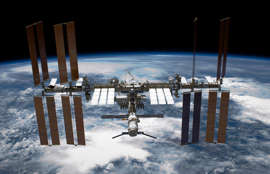
Moscow. The 21st of April. INTERFAX.RU – Russia does not plan to undock and flood its segment of the ISS, negotiations are underway with partners on the “civilized” completion of work at the station, Vladimir Solovyov, the flight director of the Russian segment of the ISS, told Interfax.
“No, no. I have already said that we have obligations between states until 2025, we are going to fly. It's another matter that the procedure for the civilized completion of work at the station takes time and it might even be necessary to start discussing it now,” said Solovyov , answering the question whether the option of undocking and flooding the station after the completion of Russia's participation in the ISS project is being considered.
According to him, the Russian segment of the ISS has processed its resource by one and a half times. “We have created (the station – IF ) was 15 years old, according to the experience of” Mir “, and now it is already 22, in 2025 it will be 27”, – said Solovyov.
Earlier on Wednesday, the head of Roscosmos, Dmitry Rogozin, said that after leaving the station, responsibility for the Russian segment could be transferred to partners on the ISS. The option of commercial use is also not excluded.
According to him, it is planned to complete the deployment of the station by 2030. The first module will be launched in 2025. The base of the station will be a scientific and energy module, which will be specially modified. Previously it was planned to use it on the ISS.
Rogozin said that about 80% of the equipment on the Russian segment of the ISS has reached its end of life and the cost of its maintenance after 2025 will be comparable to the cost of creating a new station. Roskosmos, he said, is ready to start building the station today and is awaiting appropriate instructions from the government and the president.
The new station will not be permanently inhabited, like the ISS, but will be visited due to the increased radiation hazard. Russian Academy of Sciences President Alexander Sergeev noted that it is planned to use robots and artificial intelligence at the station.

